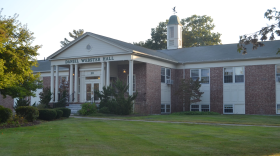Catherine Nieves didn’t know that asphalt is used to build roads and highways until she learned about a company that wants to produce it very close to her home.
Her neighborhood, which is only a mile from Nashua’s downtown, is a mix of apartments, small businesses, and home to two Latino churches. Many Brazilians, Puerto Ricans, and people of color live in and around Temple Street. About 30% of the population in this area is Hispanic and 3% Black.
Nieves says really likes where she lives, and often spends summer weekends grilling on her sidewalk.
But her community isn’t just residential. Nearby there is also a recycling center and a granite and gravel company. The city’s zoning allows this kind of industrial development in this neighborhood.
Recently Newport Construction Corporation, which has plants in New Hampshire and Massachusetts, submitted an application to build a new batch asphalt facility in a big lot near Nieves's home.
“It’s very close; it’s right there,” she said while pointing to the lot just 500 yards away.

Newport Corporation says it will be a state-of-the-art facility: it told city officials it would be quiet and use a chemical to eliminate smells from the plant.
But the city's planning board and some neighbors are concerned about the health impacts a plant like that would have in an area with so many apartments.
During a recent public hearing, the board asked Newport if it knew the proposed plant would be in a residential area. According to meeting minutes, the company said it didn't know what the city was talking about.
The proposal worries Michael Lefavor, who opposes the plant. He’s a developer turning a nearby factory that once produced clothes hangers into 88 apartments. It's just 100 feet away from the proposed plant site. In a state where housing is difficult to find, he says an asphalt plant close by is detrimental.
“You will have construction, dust, odor. All of that will be thrown to a hundred tenants here next year,” he said.
If approved, up to 150 trucks will transit the neighborhood daily.
The Environmental Protection Agency has looked at asphalt plants, and it found they can release hazardous pollutants and particulate matter from combustion, like arsenic and lead.

The state’s environmental regulators told NHPR that any plant could pose a risk to the environment and health. But if the plant is built, the Department of Environmental Services will have to monitor air and water quality strictly.
For its part, in a written comment to NHPR, Newport did not specify what chemicals their plant could release.
Lefavor says he was curious and went to visit another of Newport's asphalt plants in Westford, Massachusetts. Prior to construction, that site was fined twenty thousand dollars for ground-water violations.
He didn’t like what he saw.
“It’s a constant noise of production. I don't think it is the right fit in this town, in this location,” he said.
In its comment to NHPR, Newport Construction Corporation said the proposed Nashua facility would have an indoor area for trucks to unload.
While the proposed location is zoned for this kind of project, the city has an ambitious Master Plan: it wants to add a commuter rail station in this area and attract more development.
Lakingdri Granderson has been waiting for more investment in her neighborhood. If the plant gets approved, she says she’ll be disappointed.
“People will have to deal with it, but just because we are not wealthy doesn't mean our health doesn’t matter,” she said.

Notifications about the asphalt plant application were sent to building owners. But renters, like Granderson, didn’t get that information directly. And she says her landlord didn’t tell her.
That’s something Tom Irwin from the Conservation Law Foundation, an environmental advocacy organization in New Hampshire, says is typical of an imbalance of power.
Low-income communities and communities of color often have a problem challenging permits because they are not notified in the first place.
Irwin says, unlike Massachusetts or Vermont, New Hampshire doesn’t have an environmental justice law that states that a community shouldn’t bear a disproportionate amount of environmental harm. In New Hampshire, the Department of Environmental Services has a policy with recommendations but no teeth.
“It doesn’t really have an impact on permitting decisions, and that’s problematic,” said Irwin.
Residents like Granderson say they’re already experiencing health impacts from other factories in the neighborhood.
“If we put fans in the window, that air comes straight through and like the fan is black, so then to add another plant in this area, you’re pretty much saying the lives of the people around here don’t matter,” she said.
The city of Nashua says its conducting an independent study on potential air and water impacts before making a final decision. Officials don’t know how long that will take.
In the meantime, some residents wonder why the application exists at all.
When Nashua’s officials asked Newport Construction Corporation why they would build a plant in an area like this, the owner answered, ”Why not? It’s a permitted use."








